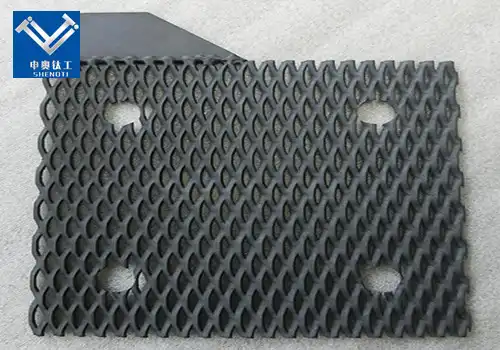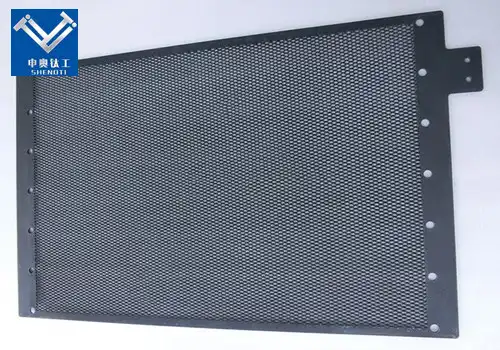
What Are the Applications of Titanium Anodes in Salt Water Electrolysis?
2025-04-08 15:20:09
Electrolysis of salt water is a fundamental process in various industries, including water treatment, chemical production, and marine applications. Central to this process is the anode material, which plays a critical role in the efficiency and longevity of the electrolysis system. Titanium anodes have emerged as a preferred choice due to their exceptional properties.
What Is a Titanium Anode and How Is It Developed?
A titanium anode is a type of electrode made from titanium, often coated with a layer of electrocatalytic material to enhance its performance in electrochemical reactions. The development of titanium anodes involves several key steps:
Substrate Preparation: High-purity titanium is selected for its excellent corrosion resistance and mechanical strength. The titanium surface is meticulously cleaned and roughened to ensure strong adhesion of the coating.
Coating Application: The prepared titanium substrate is coated with a thin layer of noble metals or metal oxides, such as ruthenium oxide (RuO₂), iridium oxide (IrO₂), or platinum. These coatings are applied using techniques like thermal decomposition or electroplating, resulting in a uniform and adherent layer.
Thermal Treatment: The coated titanium is subjected to controlled heating to enhance the adhesion and crystallinity of the coating, thereby improving its electrocatalytic properties and durability.
This development process results in a titanium anode that combines the structural benefits of titanium with the catalytic efficiency of the coating, making it highly effective for use in electrolysis, especially in corrosive environments like salt water.
How Do Titanium Anodes Function in Salt Water Electrolysis?
In the electrolysis of salt water, titanium anodes serve as the site for the oxidation reactions. The process operates as follows:
Electrolyte Composition: Salt water, primarily composed of sodium chloride (NaCl) dissolved in water, serves as the electrolyte.
Electrochemical Reaction: When an electrical current is applied, chloride ions (Cl⁻) migrate towards the titanium anode. At the anode, these chloride ions undergo oxidation to produce chlorine gas (Cl₂):
2Cl−→Cl2(g)+2e−
Role of the Coating: The electrocatalytic coating on the titanium anode facilitates this oxidation reaction by lowering the overpotential, which is the extra voltage required to drive the reaction. This results in increased efficiency and reduced energy consumption.
Corrosion Resistance: The titanium substrate provides structural integrity and resists corrosion in the aggressive chloride-rich environment, ensuring the longevity of the anode.
This efficient functioning of titanium anodes in salt water electrolysis makes them ideal for applications such as chlorine generation for water disinfection and marine biofouling prevention.
What Are the Advantages of Using Titanium Anodes in Electrolysis?
Titanium anodes offer several significant advantages in electrolysis processes:
Durability and Longevity: Titanium's inherent corrosion resistance, combined with the stability of the noble metal coatings, results in anodes with extended service life, reducing the frequency and cost of replacements.
Energy Efficiency: The electrocatalytic coatings reduce the overpotential required for the oxidation reactions, leading to lower energy consumption and operational costs.
Consistent Performance: Titanium anodes maintain stable electrode spacing and dimensions during operation, ensuring consistent performance and product quality over time.
Environmental Compatibility: The use of titanium anodes minimizes the introduction of contaminants into the electrolyte, resulting in higher purity products and reduced environmental impact.
Versatility: Titanium anodes can be tailored with various coatings to suit specific applications, making them adaptable to a wide range of electrochemical processes.
These advantages make titanium anodes a preferred choice in industries requiring efficient and reliable electrolysis systems.
What Are the Applications of Titanium Anodes in Salt Water Electrolysis?
Titanium anodes are utilized in various applications involving salt water electrolysis:
Chlorine Generation for Water Treatment: In swimming pools and municipal water treatment facilities, titanium anodes are used to generate chlorine in situ from salt water, providing an effective method for disinfection.
Marine Biofouling Prevention: Titanium anodes are employed in electrochlorination systems to produce chlorine that prevents the growth of marine organisms on ship hulls and seawater intake systems, enhancing operational efficiency and reducing maintenance costs.
Chemical Production: Industries utilize titanium anodes for the production of chemicals such as sodium hypochlorite and chlorates through the electrolysis of brine solutions.
Desalination Processes: In desalination plants, titanium anodes are used in the pretreatment stages to control biofouling and scaling, ensuring efficient operation of reverse osmosis membranes.
Cathodic Protection Systems: Titanium anodes are used in impressed current cathodic protection systems to prevent corrosion of submerged structures, such as offshore platforms and pipelines, by generating protective currents in seawater environments.
The versatility and reliability of titanium anodes make them integral components in these and other applications involving salt water electrolysis.
Contact Us
For more information on titanium anodes and how they can enhance your electrolysis processes, please contact us at:
Email: zh@baojiti.com.cn











_1735364779995.webp)


